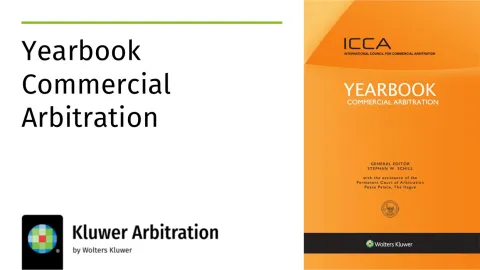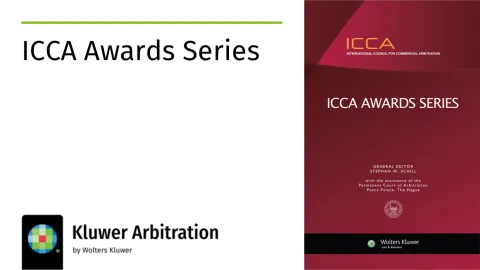2025 Australian Arbitration Week Recap: Revolutions and Solutions: Future-Proofing Arbitration
October 16, 2025
On 13 October 2025, Sydney, Australia played host to the 13th International Arbitration Conference (“Conference”), organised by the Australian Centre for International Commercial Arbitration (“ACICA”) and its co-host, the Chartered Institute of Arbitrators Australia (“CIArb”).
As the lead event for Australian Arbitration Week, the Conference brought together local and international experts to discuss current and evolving topics of interest in international arbitration. The Conference’s theme was “Revolutions and Solutions: Future Proofing Arbitration”.
Through a keynote address, six panel discussions and a fireside chat, panelists explored how international arbitration is both adapting to and offering solutions for some of the most significant issues facing the world today, from Generative AI to globally-disrupted supply chains, and tariffs and trade measures. The discussions demonstrated that arbitration continues to adapt effectively to the changing expectations of parties and wider stakeholders. Moreover, it was clear that while arbitration is by no means a complete solution to global disruption, and that there are notable differences in jurisdictions around the world, arbitration may indeed offer avenues of recourse in the increasingly disconnected world we find ourselves in. There is, however, a real need for stakeholders, including arbitral institutions, to take steps to “future-proof” arbitration to ensure it remains fit for purpose.
Keynote Address by the Honourable Andrew Bell, Chief Justice of New South Wales: AI in Arbitration
In his Keynote Address on ‘AI in Arbitration’, Chief Justice Bell, acknowledged that he has adopted a comparatively cautious approach to the use of Generative AI in the Supreme Court of New South Wales compared to most other jurisdictions (both in Australia and internationally). In the arbitration context, his Honour focused on the problems of fabrication (of text and deepfake imagery) and especially delegation of decision-making. In that regard, tribunals and awards may be challenged on public policy grounds for lack of impartiality, given Generative AI could incorporate imperceptible biases by relying on previous public arbitration awards (which may themselves be biased), or alternatively, by intentionally incorporating biases into algorithms. Moreover, objections could be based on the inherent importance of having a human decision-maker, with capacity for empathy and emotional intelligence, for maintaining public confidence in the administration of justice.
Panel Discussion: Disrupted Supply Chains
With Julia Dreosti (Clifford Chance, Adelaide/Perth) chairing, this session explored themes of force majeure (“FM”), hardship clauses, and scenarios involving a change in circumstances. This is an area where triggers and forms of relief still vary significantly (see e.g., here) across legal systems, including somewhat more flexible approaches under some civil law systems (including the possibility of courts or arbitrators adjusting the contract to the new unexpected situation) and a stricter approach under Anglo-Commonwealth contract law. Michael Polkinghorne (White & Case, Paris) emphasised that the former is also found in much of North Africa, the Gulf, and South America, with adjustment for hardship sometimes even non-derogable by party agreement.
Tim Nelson (Skadden Arps, New York/London) mentioned the impact of the Russian invasion of Ukraine and consequent sanctions, which triggered more claims under FM clauses than the 2021 Asian supply chain disruptions (owing to COVID-19 and the Biden-era tariffs),the initial 2020 lockdowns, or other pandemic measures. In fact, the 2020 lockdowns did not result in as many disputes as expected by legal advisors as FM clauses do not often encompass the “regulatory slow burn” situations experienced during the pandemic.
More generally, Leah Ratcliff (Santos Ltd, Adelaide) emphasised that disputes around FM or hardship could be proxies for a wider relationship problem, prompting in-house lawyers to address it to prevent disputes escalating into arbitration. Ms Ratcliff observed that confidentiality is very helpful to achieve this goal, and for efficient dispute resolution more generally. However, she noted that over the last decade, (domestic) stakeholders have had higher expectations, about transparency.
Supply chain issues can also implicate human rights, and Ashwita Ambast (PCA) outlined the 2013 Bangladesh Accord and subsequent initiatives to deal with such disputes through internationally enforceable arbitration. Labour-related dispute resolution under a 2023 arrangement beyond Bangladesh includes some expedited features. This generated some concerns expressed by other panellists especially around time limits for commercial arbitrations.
These themes show the multiple ways that changes in global circumstances and supply chains have altered the risk profile involved with commercial contracting. Consequently, there is a heightened need for lawyers to be aware of the likely contractual scope of a FM clause, to understand broader relationship problems that a client may be facing, and to appreciate how supply chain concerns can also implicate human rights issues.
Panel Discussion: Tariffs, Trade Bans, and Sanctions
In recent years, tariffs, trade bans, and sanctions have featured on the front pages of newspapers across the globe. This panel, chaired by Monty Taylor (Tenth Floor Chambers, Sydney) explored whether ISDS could provide foreign investors with an effective challenge mechanism, and whether it has done so in the past.
Salim Moollan KC (Brick Court Chambers, Singapore) discussed arbitrary and discriminatory tariffs and emphasised investors must show that operations in the host State suffered loss protected under the treaty. Mr Moollan KC observed two differences between tariffs and taxes in this context: (1) a tariff is imposed “at the border”, whereas most taxes challenged in ISDS concern taxes “behind the border”; and (2) tariffs are regulated under the WTO interstate dispute settlement system, which has broken down (due to successive US governments blocking Appellate Body appointments since 2017). ISDS could possibly fill this gap, even at some risk of disrupting the overall system, which is anyway challenged by a proposed ISDS carveout in the revised OECD Model Tax Convention (see e.g., here).
Dr Elizabeth Sheargold (Monash University, Melbourne) agreed that ISDS claims are possible, evidenced by NAFTA claims against Mexico’s tax impacting soft drinks, especially if the tariffs discriminate (for example, against most favoured nation treatment) and/or are arbitrary regarding tariff exceptions for some products from some states.
As for invoking the essential national security exception especially under investment treaties, Dene Yeaman (DFAT) explained that the Australian government is currently seeking to remove and otherwise renegotiate ISDS and other investment provisions in older treaties, including by expanding provisions on the “right to regulate” (see here). The government is also keen to clarify in treaties that it carves out sanctions issues under Australian domestic law, or at least UN resolutions.
The second topic was about potential ISDS claims for trade bans. Lucy Martinez (independent arbitrator, Queensland) outlined a recent successful investment treaty claim for the violation of fair and equitable treatment by a Qatari pharmaceutical company against Saudi Arabia. Although the tribunal acknowledged Saudi Arabia’s security rationale to break diplomatic (and therefore trade) links due to terrorism concerns, it still found those measures were arbitrary in contravention of investment protections, since some exceptions were made, for example, for pilgrimages.
The panel concluded with a wide-ranging discussion of whether the pursuit of such claims poses a systemic risk to ISDS or international investment law, or instead provides an opportunity to restore some legitimacy to the system – as the general public realises that treaty-based ISDS can credibly be used to hold governments of all political persuasions to account.
Having considered the revolutions which have shaped the global economic landscape, this panel highlighted how ISDS could offer a solution, showing the enduring role for arbitration in the process, noting however that ISDS’ continued legitimacy requires further evolutions, particularly with respect to balancing investor protection with a host State’s right to regulate.
Panel Discussion: The Sounds of Silence
What can you do if key participants in your arbitration go silent? This panel explored this critical threat to the integrity of arbitration from multiple perspectives.
Jo Delaney (HFW, Sydney) outlined how to navigate a non-participating respondent as counsel for claimant, including structuring your approach based on anticipating potential grounds which a respondent may seek to later use to challenge an award for setting aside or resisting enforcement, and utilising the tools available to assist an arbitrator, such as the CIArb’s Practice Guideline on Party Non-Participation.
In navigating a silent arbitrator, Sarah Grimmer (Twenty Essex, Singapore), emphasised the importance of having provisions in place for the replacement of arbitrators and the valuable role of institutions in exerting pressure on non-active arbitrators to protect the integrity of the proceedings.
Swee Yen Koh SC (Wong Partnership, Singapore) provided practical tips, utilising examples from Singapore, for dealing with a witness who is unavailable, uncooperative, or who otherwise refuses to show up. These included the importance of using court processes, such as subpoenas, to procure documents or evidence from witnesses, or third parties who are not party to the arbitration, and the ability to utilise certain legislative provisions that allow courts to assist in taking evidence for arbitrations, regardless of the arbitration's seat.
Finally, Simon Davis (Francis Burt Chambers, Perth) explored options to address circumstances where a party, or a non-party, breaches confidentiality obligations in arbitration. Confidentiality is statutorily required in Australia under the International Arbitration Act 1974 (Cth), with the exception of parties, representatives, witnesses, and tribunal members. The Panel explored how enforcing confidentiality is a live issue, including the possibility of obtaining injunctions to prevent publication of information relating to confidential arbitration cases. Such discussions ensure that arbitrations are conducted in a manner that upholds the integrity of the process while balancing transparency and public interest considerations.
Fireside Chat with Professor Bernard Hanotiau
Premala Thiagarajan SC (List A Barristers, Melbourne) sat down with Professor Bernard Hanotiau (Hanotiau Tossens Goldman, Brussels) on the occasion of the 20th anniversary of his book, ‘Complex Arbitrations: Multi-party, Multi-contract & Multi-issue’.
Ms Thiagarajan and Professor Hanotiau explored one of the most complex issues in modern large-scale arbitrations: the extent to which arbitration clauses can bind non-signatories, and whether a non-signatory’s conduct (for instance through negotiation, performance or termination of a contract) can give rise to consent to arbitration. Revisiting the well-known Dow Chemical award, Professor Hanotiau remarked that this issue is not a question of “extension” of the arbitration clause, rather a “determination of its scope”. Against this risk of an arbitration clause being broader in scope than a party intended, particularly in light of a trend of tribunal and court rulings where non-signatories have been bound to arbitration based on their conduct, parties and their lawyers must pay careful attention to drafting, to avoid unintended consequences.
Closing Reflections
The Conference demonstrated that amidst economic, technological, and political revolutions worldwide, arbitration continues to evolve to provide solutions allowing for the just and efficient resolution of disputes. When considering the future-proofing of arbitration, one thread was clear throughout the sessions: this requires more than embracing technology (Generative AI or otherwise) or streamlining procedure, it demands a fundamental commitment to adaptability, inclusivity and integrity, to adequately address both economic and legal revolutions which have occurred, and those which will occur in the future.
More coverage from Australian Arbitration Week is available here.
You may also like










